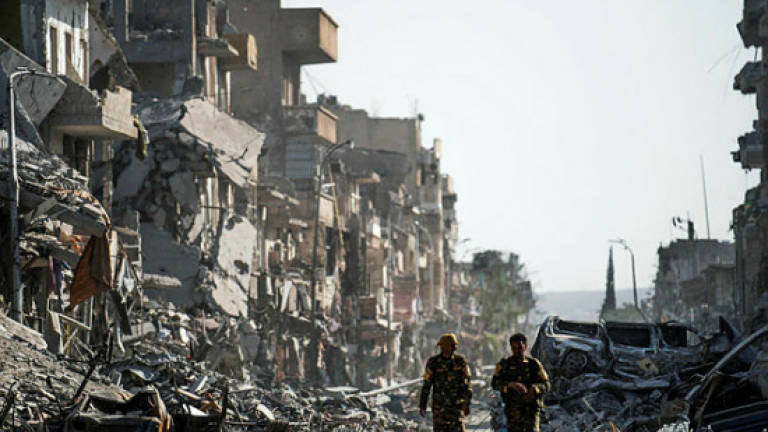What impact will Raqa's fall have on Syria's complex war?

THE Islamic State group's former Syrian stronghold Raqa has been captured, dealing the jihadists another severe blow, but how does the victory affect other parties to the country's complex war?
The city was captured by the Syrian Democratic Forces, an alliance of Kurdish and Arab fighters, that battled IS inside Raqa for more than four months before declaring victory.
How does regime view the victory?
Syria's state media has been notably silent on Raqa's capture, and has regularly dismissed the US-led coalition's war against IS as a failure.
While the city's capture by a Kurdish-led, US-backed force could be seen as embarrassing, its strategic importance is fairly minimal, especially compared to oil-rich neighbouring Deir Ezzor, said Fabrice Balanche, a Syria expert.
"Raqa has no strategic importance at the regional level, or even at the Syrian level, which is not the case of Deir Ezzor," added Balanche, a visiting fellow at Stanford University's Hoover Institution.
A Russian-backed Syrian regime operation is under way in Deir Ezzor, which lies along the border with Iraq, and has captured large stretches of territory.
The SDF is also battling in part of Deir Ezzor, but Balanche said he expected regime forces to soon "turn towards the east and the Iraqi border to definitively cut the SDF's route".
"The priorities of the state for the moment are clear, reaching Albu Kamal, the Syrian-Iraqi border, and finishing with Deir Ezzor," added Bassam Abu Abdullah, who runs the Damascus Centre for Strategic Studies and is close to the government.
What does this mean for the Kurds?
Syria's Kurds largely stayed out of the uprising against the government that began in Mar 2011, opting instead to build their own semi-autonomous institutions.
They control large swathes of Kurdish-majority parts of north and northeast Syria that they call Rojava, but their moves to consolidate their control have angered both Damascus and neighbouring Turkey.
The Kurdish People's Protection Units (YPG) forms the backbone of the SDF militia that captured Raqa and it may seek to leverage the victory in negotiations over the status of areas under its control.
The SDF "would appear well suited to negotiate with the regime for some sort of ceasefire arrangement with the regime", said Aaron Stein, resident senior fellow at the Atlantic Council's Rafik Hariri Centre.
It remains unclear if the Kurds would seek to incorporate Sunni Arab-majority Raqa into their semi-autonomous region, or instead use it as a bargaining chip to protect their other gains.
The city has been utterly devastated, and the prospect of rebuilding it alone may encourage the Kurds to simply hand the task back to the government, said Balanche.
"The reconstruction of Raqa will not be simple. And without reconstruction, an opposition will quickly protest against the city's new masters," he said.
"All this will only play into Damascus's hands."
Abu Abdullah said Syria's government would never accept parallel state institutions, including a militia like the SDF.
"For the Syrian state, the authority of the Syrian state must return to every place in Syria," he told AFP.
"A separate political structure within the Syrian state will be unacceptable, even if that means the use of force," he said.
What will the US do now?
The US-led coalition has been fighting in Syria and Iraq since 2014, but with the jihadist group largely routed from the two countries, it may begin seeking to wind down operations.
Washington has effectively abandoned its engagement with Syrian anti-regime rebels, and concentrated its efforts on fighting jihadists and containing Iranian influence.
It has shown little interest in an extended presence in Syria, but it may decide ongoing engagement is necessary to contain Iranian influence.
"I personally think there will be a pull to keep a residual US force in northeast Syria, as a bulwark against Iran, and to continue to target IS," said Stein.
A complete US withdrawal would leave Washington's erstwhile Kurdish allies vulnerable to both Damascus and Ankara.
"Washington's need to balance allies against each other and the sheer inertia of politics ... could well lead to a situation where America settles in for a more permanent presence as protectors of the SDF in eastern Syria," wrote Aron Lund, a fellow at the Century Foundation. — AFP